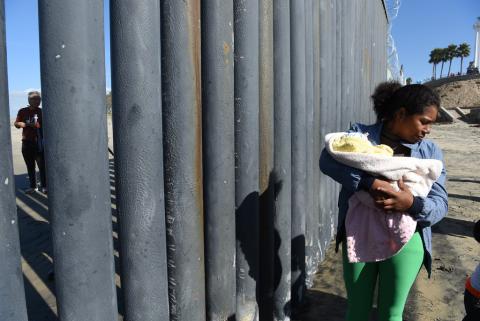
Civil society groups outlined migration policy priorities in a letter to Pres. Biden before the Summit of the Americas in Los Angeles in June 2022. The following article was published in the July-August 2022 issue of NewsNotes.
Leaders of 23 Western Hemisphere countries attended the ninth Summit of the Americas in Los Angeles on June 6–10, with a focus on building cooperation on shared challenges, including economic recovery, climate change, health, and migration. While some in Washington said the meeting, held every three years, was unlikely to produce any substantial outcomes, religious and humanitarian organizations saw it as opportunity for neighboring countries to listen and dialogue on shared concerns.
Prior to the summit, more than 100 civil society organizations sent a letter to Pres. Joe Biden outlining their recommendations for the summit’s Declaration on Migration and Protection. Their priorities include:
Protecting the Rights of Refugees and Migrants, including Ensuring Access to Asylum
Ensuring protection-sensitive border policies uphold the obligation of non-refoulement, identify needs, and ensure meaningful access to asylum procedures for those seeking protection. Border officials must be trained to identify asylum seekers and refer them for interviews and to ensure migrants and asylum seekers have access to information and support in their own language, to humanitarian organizations, and to health and legal service providers. Parallel to this, the Biden administration should continue to pursue an end to the Migration Protection Protocols (MPP) and Title 42–which deny asylum seekers access to protection and send them back to harm– by strenuously fighting court and legislative efforts to impede their termination.
Reviewing all border and protection-related law, policy, practice, and processes to determine whether they disproportionately impact BIPOC communities adversely, consistent with President Biden’s executive order on advancing racial equity.
Working domestically and with countries in the hemisphere to promote access to justice for migrants by investigating and prosecuting crimes against people on the move, searching for disappeared migrants, and identifying migrant remains.
Increasing funding and capacity to provide for humanitarian needs all along the migratory route including sustained efforts to keep migrants, asylum seekers and refugees safe from sexual and gender-based violence.
Protecting Immigrants in the U.S.
Designating Guatemala and redesignating El Salvador, Haiti, Honduras, Nicaragua and Venezuela for Temporary Protected Status.
Requesting a significant increase in funding for the provision of legal counsel to all indigent adults, children whether unaccompanied or part of a family unit, as well as other vulnerable individuals subject to removal proceedings.
Expanding Legal Pathways and Uniting Families
Creating new resettlement programs that supplement, not supplant, access to asylum, that are equitable and implemented quickly. Beyond expanding access to the Central American Minors Program and the Protection Transfer Arrangement, the administration should create new complementary pathways and refugee resettlement programs to assume its fair share of diverse refugees in the region including Haitians, Venezuelans, Nicaraguans and others.
The U.S. should restart the U.S. Refugees Admission Program in Cuba.
Ensuring that parole programs are available to more nationalities and populations, including those experiencing cross border displacement in the context of climate change, disasters and environmental degradation. Parole programs designed to reunify families should define family with a culturally-sanctioned understandings that go beyond the nuclear family.
Promoting and preserving family unity through the establishment of family reunification parole programs including for Central America, resumption of the Haitian Family Reunification Parole Program by issuing invitations to eligible Haitians, and expedited restaffing of the consular section of the U.S. embassy in Havana so as to fully implement the Cuban Family Reunification parole program.
Implementation and Consultation
Avoiding bilateral arrangements that limit eligibility for asylum and “stabilization” programs or other efforts that prevent people from leaving countries where they feel unsafe or cannot firmly settle.
Ensuring decent work and respecting labor rights across the administration’s regional migration strategy. Poor regulation and gaps in protection that have led to extensive exploitation, including widespread sex and age discrimination, require immediate resolution.
Building on regional frameworks like the Comprehensive Regional Protection and Solutions Framework, including supporting countries to strengthen and adhere to commitments laid out in national action plans that could lead to better cooperation and coordination among all relevant stakeholders throughout the region.
Developing a process of reporting on progress of states towards implementing the principles in the Declaration and providing protection and pathways through national policies announced at the Summit. The process should include engagement by civil society and organizations of affected individuals.
